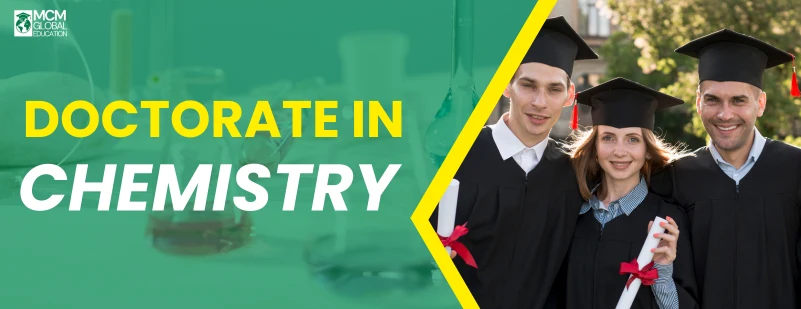Pursuing a Doctorate in Chemistry is a significant academic and professional milestone. A PhD in this field not only represents the highest level of expertise but also opens doors to careers in academia, industry, research, and policy. This guide provides a comprehensive look at everything prospective students need to know: from program types and admissions to research areas, funding options, and future career opportunities.
Table of Contents
What is a Doctorate in Chemistry?
A Doctorate in Chemistry (PhD in Chemistry) is a research-focused program where students contribute original knowledge to the field. Unlike undergraduate or master’s degrees, a doctoral program emphasizes independent research, innovation, and publishing findings in peer-reviewed journals.
A PhD typically takes 4–6 years to complete and includes coursework, lab work, and the development of a dissertation.
Types of Chemistry PhD Programs
Different structures exist for pursuing a Doctorate in Chemistry depending on the country, institution, and career goals.
| Program Type | Description |
|---|---|
| Traditional PhD | Independent research under a faculty supervisor with minimal coursework. |
| Structured PhD / DTP/CDT | Cohort-based programs with coursework, training, and interdisciplinary modules. |
| Industrial PhD | Jointly supervised by a university and company, blending research with industry. |
| International Joint PhD | Collaborative degree offered by multiple universities across countries. |
Research Areas in a Doctorate in Chemistry
One of the most exciting parts of a PhD is selecting a research specialization. Some trending areas include:
- Organic Chemistry – synthesis of new compounds, pharmaceuticals.
- Inorganic Chemistry – metals, coordination chemistry, catalysis.
- Analytical Chemistry – spectroscopy, chromatography, method development.
- Physical Chemistry – thermodynamics, kinetics, quantum chemistry.
- Chemical Biology – chemistry applied to biological systems.
- Computational Chemistry & AI – molecular modeling, machine learning in drug discovery.
- Green Chemistry – sustainable chemical processes.
- Nanotechnology – materials, energy storage, targeted drug delivery.
Emerging fields like quantum computational chemistry, artificial photosynthesis, and cheminformatics are becoming highly sought-after areas for research.
Choosing the Right PhD Topic
Selecting a dissertation topic in a Doctorate in Chemistry requires balancing novelty with feasibility. Consider:
- Originality: Does it address an unsolved problem?
- Practicality: Can it be completed within 4–5 years?
- Relevance: Does it align with global challenges (sustainability, health, energy)?
- Resources: Are lab facilities and funding available?
Pro tip: Look into interdisciplinary areas like AI in chemistry or renewable energy storage, as these fields are expanding rapidly and offer high career value.
Finding the Right Program and Supervisor
The success of your Doctorate in Chemistry depends heavily on choosing the right program and supervisor.
- Research universities that excel in your area of interest.
- Read faculty publications to see if their work aligns with your goals.
- Reach out to potential supervisors with a personalized email, highlighting shared research interests.
| Criteria | Why It Matters |
|---|---|
| Supervisor’s expertise | Guides your research direction. |
| Department reputation | Affects funding, resources, and career prospects. |
| Research facilities | Determines feasibility of experiments. |
| Funding availability | Ensures financial support for 4–5 years. |
| Career placement support | Increases chances of securing postdoc or industry roles post-graduation. |
Admissions, Application Process, and Funding
Admission Requirements
Most Doctorate in Chemistry programs require:
- Bachelor’s or Master’s degree in Chemistry or related field.
- Research experience (lab projects, publications preferred).
- GRE (some programs waive it).
- Statement of Purpose (SOP) outlining research goals.
- Recommendation letters.
Funding Options
Funding is a crucial factor when applying. Sources include:
- University scholarships & fellowships
- Research Council studentships (UK, EU)
- Industry sponsorships (for industrial PhDs)
- Government scholarships (e.g., Fulbright, DAAD)
Many PhD programs in the US and Europe provide full funding packages covering tuition and living stipends.
Coursework and Program Structure
Although a Doctorate in Chemistry focuses on research, some coursework is required.
Typical Program Structure:
| Stage | Details |
|---|---|
| Year 1 – Coursework | Advanced classes, lab rotations, safety training. |
| Year 2 – Candidacy Exam | Qualifying exams to assess readiness for research. |
| Years 2–4/5 – Research | Independent research, lab work, data collection, analysis. |
| Year 4/5+ – Dissertation | Writing and defending an original thesis. |
Life as a Chemistry PhD Student
Daily life in a Doctorate in Chemistry program involves:
- Lab research: experiments, simulations, data analysis.
- Teaching assistantships: guiding undergraduates.
- Seminars & conferences: presenting work and networking.
- Collaboration: working with interdisciplinary teams.
Work-Life Balance Challenges
- Long lab hours and failed experiments are common.
- Mental health support and peer communities are essential for success.
Career Paths After a Doctorate in Chemistry
A PhD opens diverse opportunities across sectors.
| Career Path | Examples |
|---|---|
| Academia | Postdoctoral research, assistant/associate professor. |
| Industry (Pharma & Biotech) | R&D scientist, medicinal chemist, process chemist. |
| Energy & Materials | Battery technology, sustainable fuels, nanomaterials. |
| Government & Policy | Science advisor, regulatory affairs. |
| Alternative Careers | Data science, consulting, science communication, intellectual property law. |
Increasingly, PhD chemists are moving into AI-driven drug discovery and climate-related industries.
Challenges in Pursuing a Doctorate in Chemistry
While rewarding, the PhD journey comes with hurdles:
- Research setbacks – experiments often fail.
- Time pressure – balancing deadlines, publications, and teaching.
- Funding uncertainty – some grants may not cover the full duration.
- Work-life imbalance – risk of burnout.
Solutions: Strong mentorship, networking, time management, and maintaining hobbies outside the lab.
Tips for Success in a Doctorate in Chemistry
- Start preparing early with research internships.
- Build strong relationships with your advisor.
- Publish papers regularly to boost your academic profile.
- Network at conferences to find collaborators and career opportunities.
- Stay adaptable: chemistry is evolving with AI, quantum computing, and sustainability trends.
Conclusion
A Doctorate in Chemistry is a demanding but highly rewarding journey. From selecting the right program and supervisor to specializing in cutting-edge fields like nanotechnology, AI, or green chemistry, a PhD can shape your career into academia, industry, or beyond. With proper planning, resilience, and curiosity, pursuing a doctorate can lead not only to professional success but also to meaningful contributions to science and society.
FAQs on Doctorate in Chemistry
What is a Doctorate in Chemistry?
A Doctorate in Chemistry (PhD in Chemistry) is the highest academic degree in the field. It focuses on independent research, original scientific contributions, and a dissertation, usually taking 4–6 years to complete.
How long does it take to complete a Doctorate in Chemistry?
On average, a Doctorate in Chemistry takes 4–6 years depending on the country, program structure, and research progress. In the US, programs are usually 5–6 years, while in Europe they can be 3–4 years.
What is the difference between a PhD in Chemistry and a professional doctorate?
A PhD in Chemistry is research-focused, aimed at producing new scientific knowledge. A professional doctorate (less common in chemistry) emphasizes applying existing knowledge to solve practical problems in industry or education.























